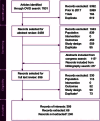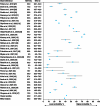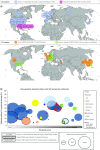Undertreatment in patients with advanced urothelial cancer: systematic literature review and meta-analysis
- PMID: 37526215
- PMCID: PMC11727863
- DOI: 10.2217/fon-2023-0298
Undertreatment in patients with advanced urothelial cancer: systematic literature review and meta-analysis
Abstract
Aim: To assess rates of no systemic treatment (NST), attrition across lines of therapy, and factors influencing treatment selection in patients with locally advanced or metastatic urothelial cancer (la/mUC). Methods: Systematic literature review to identify real-world studies reporting NST or attrition rates in la/mUC from 2017-2022 (including data reported since 2015). Results: Of 2439 publications screened, 29 reported NST rates, ranging from 40-74% in eight European-based studies, 14-60% in 12 US-based studies, and 9-63% in nine studies in other locations (meta-analysis estimate, 39%). Factors associated with NST or no second-line therapy included older age, female sex, poor performance status, poor renal function and distant metastases. Conclusion: A substantial proportion of patients with la/mUC do not receive guideline-recommended treatment.
Keywords: attrition; best supportive care; chemotherapy; immunotherapy; palliative therapy; platinum-based chemotherapy; systemic therapy; treatment decisions; urothelial cancer.
Plain language summary
A review of how patients with bladder cancer are treated or not treated with anti-cancer drugsPeople with advanced bladder cancer have a short survival. Bladder cancer is called advanced when it has spread outside of the urinary tract. Several drug treatments are available for people with advanced bladder cancer. However, sometimes people do not receive any drug treatment. We looked at published studies to see how many people with advanced bladder cancer did not receive any drug treatment and the reasons why. We also looked at how long people lived with or without drug treatment. We found that many people with advanced bladder cancer did not receive drug treatment. The number of people who received no drug treatment varied in studies from different countries. People who were older, were female, had poor health or kidney problems, or had cancer that had spread to other parts of the body were less likely to receive drug treatment. People who did not receive drug treatment lived for an average of 2 to 7 months, compared with 9 to 35 months for people who received drug treatment. More studies are needed to investigate the reasons why drug treatment is sometimes not used in people with advanced bladder cancer who could receive treatment, so that more people can benefit from available treatments.
Conflict of interest statement
This study was sponsored by Merck (CrossRef Funder ID: 10.13039/100009945), and was previously conducted under an alliance between Merck and Pfizer. M Kearney is an employee of Merck. L Zhang, E Hubscher, M Musat, S Harricharan, and T Wilke are employees of Cytel, Inc, which served as a consultant on the project. The authors have no other relevant affiliations or financial involvement with any organization or entity with a financial interest in or financial conflict with the subject matter or materials discussed in the manuscript apart from those disclosed.
Editorial support was provided by Katherine Quiroz-Figueroa of Clinical Thinking and was funded by Merck and Pfizer.
Figures




Similar articles
-
Real-world avelumab first-line maintenance in advanced urothelial carcinoma: systematic review and meta-analysis.Future Oncol. 2025 Apr;21(9):1113-1124. doi: 10.1080/14796694.2025.2475734. Epub 2025 Apr 4. Future Oncol. 2025. PMID: 40184226 Free PMC article.
-
A rapid and systematic review of the clinical effectiveness and cost-effectiveness of paclitaxel, docetaxel, gemcitabine and vinorelbine in non-small-cell lung cancer.Health Technol Assess. 2001;5(32):1-195. doi: 10.3310/hta5320. Health Technol Assess. 2001. PMID: 12065068
-
Systemic pharmacological treatments for chronic plaque psoriasis: a network meta-analysis.Cochrane Database Syst Rev. 2021 Apr 19;4(4):CD011535. doi: 10.1002/14651858.CD011535.pub4. Cochrane Database Syst Rev. 2021. Update in: Cochrane Database Syst Rev. 2022 May 23;5:CD011535. doi: 10.1002/14651858.CD011535.pub5. PMID: 33871055 Free PMC article. Updated.
-
Cost-effectiveness of using prognostic information to select women with breast cancer for adjuvant systemic therapy.Health Technol Assess. 2006 Sep;10(34):iii-iv, ix-xi, 1-204. doi: 10.3310/hta10340. Health Technol Assess. 2006. PMID: 16959170
-
Antidepressants for pain management in adults with chronic pain: a network meta-analysis.Health Technol Assess. 2024 Oct;28(62):1-155. doi: 10.3310/MKRT2948. Health Technol Assess. 2024. PMID: 39367772 Free PMC article.
Cited by
-
Real-world epidemiology and treatment patterns of patients with locally advanced or metastatic urothelial carcinoma: Retrospective analysis of Diagnosis Procedure Combination claims data in Japan.Int J Urol. 2024 Jul;31(7):730-738. doi: 10.1111/iju.15450. Epub 2024 Mar 12. Int J Urol. 2024. PMID: 38468564 Free PMC article.
-
Target trial emulation to evaluate the effect of immune-related adverse events on outcomes in metastatic urothelial cancer.Cancer Immunol Immunother. 2024 Dec 21;74(1):30. doi: 10.1007/s00262-024-03871-7. Cancer Immunol Immunother. 2024. PMID: 39708183 Free PMC article.
-
Nationwide Study of Real-World Treatment Patterns and Clinical Outcomes in Patients with Metastatic Urothelial Carcinoma in Hungary.Adv Ther. 2023 Dec;40(12):5475-5488. doi: 10.1007/s12325-023-02694-9. Epub 2023 Oct 13. Adv Ther. 2023. PMID: 37831384 Free PMC article.
-
Real-world treatment patterns and clinical outcomes in patients with locally advanced or metastatic urothelial carcinoma in Germany: retrospective CONVINCE study.J Cancer Res Clin Oncol. 2025 Mar 5;151(3):100. doi: 10.1007/s00432-025-06131-y. J Cancer Res Clin Oncol. 2025. PMID: 40042678 Free PMC article. Review.
-
A Podcast on Practical Considerations in Patients with Advanced Urothelial Cancer Receiving First-Line Cisplatin- or Carboplatin-Based Chemotherapy Followed by Avelumab Maintenance in a Changing Therapeutic Landscape.Adv Ther. 2024 Sep;41(9):3441-3451. doi: 10.1007/s12325-024-02922-w. Epub 2024 Jul 18. Adv Ther. 2024. PMID: 39023740 Free PMC article.
References
-
- Siegel RL, Miller KD, Jemal A. Cancer statistics, 2020. CA Cancer J. Clin. 70(1), 7–30 (2020). - PubMed
-
- Fitzmaurice C, Abate D, Abbasi Net al. . Global, regional, and national cancer incidence, mortality, years of life lost, years lived with disability, and disability-adjusted life-years for 29 cancer groups, 1990 to 2017: a systematic analysis for the global burden of disease study. JAMA Oncol. 5(12), 1749–1768 (2019). - PMC - PubMed
-
- Sung H, Ferlay J, Siegel RLet al. . Global cancer statistics 2020: GLOBOCAN estimates of incidence and mortality worldwide for 36 cancers in 185 countries. CA Cancer J. Clin. 71(3), 209–249 (2021). - PubMed
Publication types
MeSH terms
Grants and funding
LinkOut - more resources
Full Text Sources
Other Literature Sources
